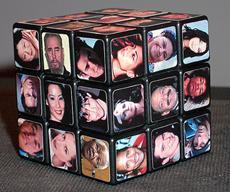
Image courtesy of nathangibbs under a Creative Commons license: BY-NC-SA.
This workshop is designed to last approximately 1.5 hours and will assist faculty in facilitating discussions on race, gender, sexual orientation and socioeconomic diversity. Upon viewing four different scenes from the Academy Award-winning movie Crash, participants will engage in active discussion sessions in which they reflect on their impressions of the actors, situations and themes of each scene. Participants will be asked to discuss the contentious and emotional issues that had created the situation in each scene as the basis for exploration of their own personal and professional experiences and identities.
Training medical students to address health care disparities based on race, gender, sexual orientation, and socioeconomic class involves, not only education on epidemiologic and clinical evidence for the existence of such disparities, but also the fostering of critical awareness of the impact of assumptions, biases, and prejudice on physician-patient interactions. Development of critical awareness may be achieved through engaged small group discussions in a safe environment and requires instructors who are skilled at facilitating discussions on potentially contentious issues, such as race, gender, sexual orientation, and socioeconomic class. In preparation for teaching in these areas, it is essential that the instructors themselves reflect on their own biases, values, and perspectives and model the types of discussions they will facilitate.
Instructor: Monica Lypson
Structure: Faculty Development Workshop
NLM Citation: Lypson M , Ross P, Joiner T, Kumagai A, Using Multimedia in Faculty Development on Multicultural Education: Scenes from the Movie "Crash". MedEdPORTAL; 2010. Available from:http://services.aamc.org/30/mededportal/servlet/s/segment/mededportal/?subid=8008
Learning Outcomes
This workshop is a unique tool for getting faculty to reflect on their own attitudes toward race and diversity (e.g., race, socioeconomic class and gender) and to capture the interest and involvement from the audience. This workshop also provides faculty with an opportunity to (1) discuss how best to manage opposing opinions and difficult topics in the classroom environment and (2) recognize how struggling with these issues themselves informs them of how students may deal with similar issues.
Participants should learn to:
- Gain increased critical consciousness and critical thinking of the faculty as it relates to pedagogical theory.
- Develop skills in facilitating discussions on issues of diversity, the roles both positive and negative of conflict in interpersonal relationships and small group dynamics.
- Emphasize the importance of critical reflection on personal values and perspectives in fostering awareness of societal problems and approaches to their solutions.
Reading List
Video
We recommend having all workshop participants view the movie Crash in its entirety prior to attending the workshop. It is not critical, but helpful. These are the scenes that we refer to in this module:
SCENE 1
Pawn Shop/Attempted Shooting
• 6:00–7:47
• 1:20:35–1:22:02
SCENE 2
Blind Fear/Freeing the Slaves
• 7:48–10:00
• 1:45:19–1:46:56
SCENE 3
Telephone Conversation/Meeting with Insurance Manager
• 15:32–16:14
• 46:24–49:07
SCENE 4
First Traffic Stop/Bedroom conversation/Second Traffic Stop
• 17:17–22:24
• 23:15–25:05
• 1:14:29–1:18:33
References
Kinefuchi, E. and Orbe, M. 2008. Situating Oneself in a Racialized World: Understanding Student Reactions to Crash through Standpoint Theory and Context-Positionality Frames. Journal of International Intercultural Communication, 1:1:70-90.
Vallalba, J.A. and Redmond, R.E. 2008 . Crash: Using a Popular Film as a Experiential Learning Activity in a Multicultural Counseling Course. Counselor Education & Supervision, 47:264-276.
Kumagai, A.K. and Lypson, M.L. 2009. Beyond Cultural Competence: Critical Consciousness, Social Justice, and Multicultural Education. Academic Medicine, 84(6):782-787.
Reilling, J.M., Ring J. and Duke, L. 2005. Visual Thinking Strategies: A New Role for Art in Medical Education. Family Medicine, 37(4): 250-252.
Kumagai, A.K., White, C.B., Ross, P.T., Perlman, R.L., Fantone, J.C. 2008. Impact of Facilitation of Small Group Discussions of Psychosocial Topics in Medicine on Faculty Growth and Development. Academic Medicine, 83(10):976-81.
Gorski, P., Culture Exercise. 2009. Found at YouthWebOnline.com under teacher activities - culture. Accessed September 21, 2009.
Schedule
Introductions: 5 mins
Overview of Intended Learning Outcomes (ILOs) & Ideals of Group Interactions: 5 mins
Scene 1 – Large Group Exercise: 10 mins
Scene 2 – Using Reflective Writing: 15 mins
Scene 3 – Small Group Interactions: 20 mins
Scene 4 – Using the "Fishbowl" Technique: 30 mins
Wrap Up & Evaluation: 10 mins
About the Creators

Monica Lypson, M.D.
Dr. Lypson is the Assistant Dean for Graduate Medical Education at the University of Michigan School of Medicine. Throughout her career, Dr. Lypson has focused on medical education. She has worked with the National Board of Medical Examiners and the Accreditation Council on Graduate Medical Education and has served on numerous committees that have allowed her to explore medical education at local, regional and national levels. She uses this expertise to monitor the accreditation status and educational quality of our residency programs.
Dr. Lypson's research interests include resident assessment, historical and contemporary trends in medical education, academic leadership and the under representation of minorities in academic medicine. Several of her invited presentations and papers have focused on clinical performance assessment of medical students and residents and on recruiting minority faculty.
Dr. Lypson also plays a role in our medical school curriculum as the faculty director of the Multicultural curriculum and core faculty for the Family Centered Experience and Longitudinal Cases. more...
- Case Western Reserve University, M.D.
- Brown University, B.S.

Image courtesy of nathangibbs under a Creative Commons license: BY-NC-SA.
Jump to:
| Document Title | Creator | Downloads | License |
|---|---|---|---|
|
Workshop Evaluation |
Monica Lypson
|
| Document Title | Creator | Downloads | License |
|---|---|---|---|
|
Workshop Overview and Format |
Monica Lypson
|



